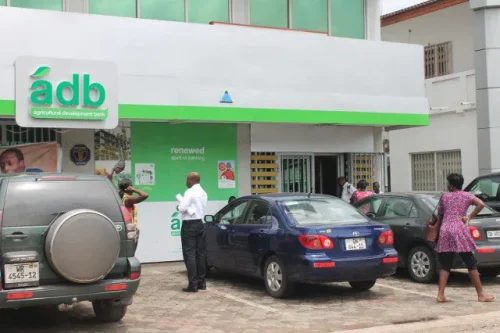The Agricultural Development Bank has more than doubled its profit after tax to GH¢282.3 million in the nine months ended September 30, 2025, positioning itself strongly ahead of the government’s planned recapitalization next year. The state owned lender’s dramatic turnaround signals renewed investor confidence and operational resilience following years of sector wide restructuring.
According to unaudited financial statements released by ADB, the 152 percent profit surge from GH¢112.1 million recorded in the same period last year was driven primarily by a 67 percent jump in net interest income to GH¢918.1 million. This improvement came from higher yielding investment securities and more efficient liability management as Ghana’s economic environment stabilizes.
Total assets expanded 17 percent to GH¢16.2 billion, with cash and cash equivalents rising 24 percent to GH¢6.47 billion and investment securities climbing 37 percent to GH¢6.45 billion. The substantial allocation to government securities reflects strategic positioning for yield and liquidity management in Ghana’s recovering economy.
Customer deposits increased from GH¢11.14 billion to GH¢12.85 billion over the period, demonstrating growing trust in the bank’s stability. This rise in deposits enhances ADB’s capacity to extend more credit to businesses, farmers and households across the agricultural value chain.
Shareholders’ equity now stands at GH¢1.56 billion, up 7.1 percent, supported by retained earnings and growth in statutory reserves. The bank recorded a reduction in accumulated losses as current profitability absorbed past deficits, continuing the capital restoration that saw shareholders’ funds recover from negative GH¢27.1 million in June 2024 to GH¢1.51 billion by mid 2025.
The bank’s liquidity ratio improved to 130 percent from 125 percent a year earlier, reinforcing its ability to meet short term obligations and maintain smooth operations. However, total liabilities rose from GH¢12.41 billion to GH¢14.66 billion, reflecting expanded business activities.
Interest income rose 27 percent despite a smaller loan book, as ADB benefited from better returns on its expanded investment securities portfolio. Interest expense declined 9 percent, contributing to substantial net interest margin improvement. Non interest revenue streams also strengthened, with net fees and commission income growing 24 percent.
Operating expenses remained well controlled, with personnel expenses rising just 12.5 percent while other operating costs decreased slightly. This disciplined cost management contributed significantly to the bottom line performance.
Finance Minister Dr. Cassiel Ato Forson announced plans to recapitalize ADB in 2026 during the inauguration of the bank’s new nine member board in July. The move aims to enhance support for farmers, agribusinesses and value chain development, aligning with ADB’s founding mandate as Ghana’s primary agricultural financier.
Kenneth Kwamina Thompson, former CEO of Dalex Finance, now chairs the reconstituted board tasked with steering the bank toward operational efficiency and refocusing on food security and rural growth. The recapitalization forms part of broader structural reforms led by the Finance Ministry to drive agro industrialization and reduce import dependency.
The strong performance positions ADB among Ghana’s banking sector recovery success stories. The institution provides approximately 85 percent of institutional credit to Ghana’s agricultural market while offering services across retail, corporate, commercial and parastatal sectors through its universal banking model.
Despite the impressive profit growth, challenges remain. At the bank’s 38th Annual General Meeting in September, shareholders approved management’s strategic direction while acknowledging ongoing issues with non performing loans, which stood at 26.9 percent of gross loans in 2024, significantly above the industry average of 21.8 percent.
ADB has launched a new strategic plan positioning itself among Ghana’s top three banks, focusing on innovation, competitiveness, operational excellence and distinctive financial solutions for the agricultural sector. With profits and assets on the rise, the bank appears well positioned to meet upcoming recapitalization requirements without major difficulty.
Beyond balance sheet improvements, this performance carries broader economic implications. A stronger ADB means greater lending support for the agricultural sector, which forms the backbone of Ghana’s economy. It also positions the bank to increase financing for small and medium scale enterprises, potentially translating into higher productivity, more jobs and improved food security across the country.
The International Monetary Fund has set a year end 2025 deadline for state owned banks to complete their recapitalization as part of its Extended Credit Facility program supporting Ghana’s financial sector stability. ADB’s strong third quarter results suggest it’s moving in the right direction to meet these requirements when government support arrives next year.
Source: newsghana.com.gh











